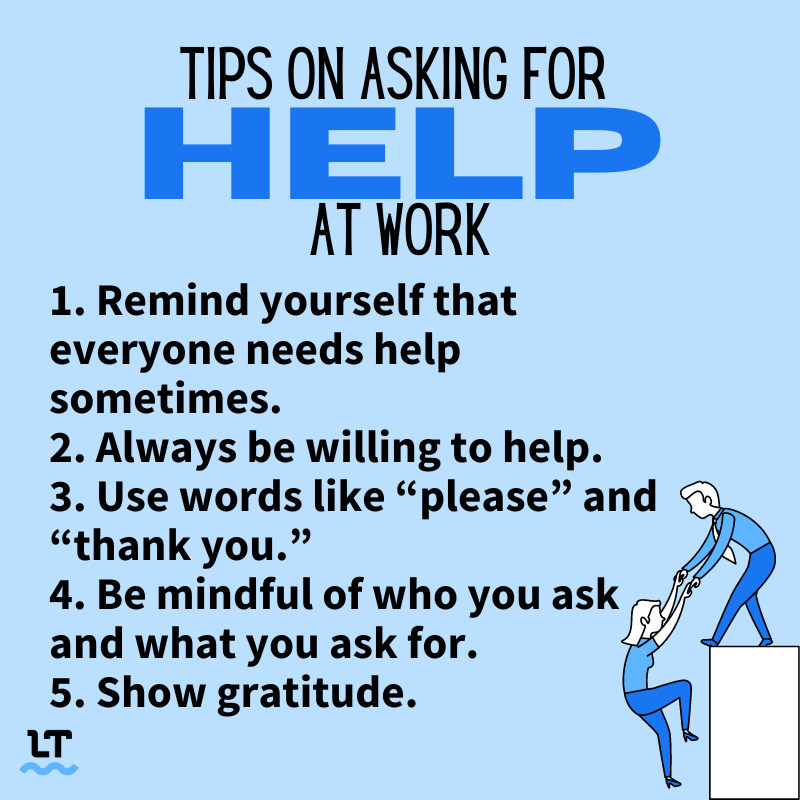Table of Contents
Tips on Asking for Help
Nine Ways To Ask for Help Politely and Professionally
- If you have a moment, I’d appreciate your help.
- If you don’t mind, I could use your help…
- Would you mind helping me?
- If it’s not too much trouble, would you mind lending me a hand?
- Can I trouble you for…?
- If you’re available, I’d be grateful for your assistance.
- Would you kindly do me a favor and…?
- May I seek your guidance with…?
- I really need some assistance. Would you mind helping me?
Everyone needs help sometimes; that’s why you shouldn’t feel bad asking for it. However, we understand that some people find it difficult to request assistance. This is especially true if you’re an English language learner and aren’t familiar with common phrases used to ask for help.
But fear not! Below, we’re going to give you helpful tips and will also review polite and professional phrases you can use in the workplace.
Let’s get to it!
Tips on Asking for Help

Asking for help will seem incredibly difficult if you believe that you’re the only one who needs it. This is simply not the case. Everyone, at one point or another, will ask for guidance, advice, or any other type of assistance. Requesting help is a part of life. The sooner you realize this, the easier it will be for you to ask for it.
2. Always be willing to help.You can create an environment where everyone is willing to help if you are helpful yourself. You don’t have to wait for someone to explicitly request it. Instead, you can be proactive and ask your colleagues if there’s anything you can do for them.
If someone does ask for help, do everything in your power to assist them. If you’re not open to being helpful, others around you won’t be open to helping you either.
3. Use words like “please” and “thank you.”This one might seem obvious, but it’s worth stating: Whenever you’re asking for something, you should use words like please and thank you. It’s good manners, and avoiding doing so may make what you’re asking for sound like a demand rather than a request.
4. Be mindful of who you ask and what you ask for.It wouldn’t make sense to ask a new hire for something that only someone in upper management can help you with. Don’t ask someone to do a task that is beyond their scope of expertise or ability. Also, this should go without saying, but don’t ask someone to do something that is wrong, illegal, or could get them in trouble in any way.
Similarly, asking for some guidance on a report you have to turn in soon is one thing, but asking someone to complete the entire report for you is another. Don’t take advantage of someone’s kindness.
5. Show gratitude.Again, when someone does take the time to help you, make sure you express gratitude. This ensures that the person feels valued and that they will be more willing to help you in the future if needed.
How To Ask for Help Politely and Professionally
1. If you have a moment, I’d appreciate your help.
This option is especially polite because it expresses that you need someone’s help, but only if they have the time to assist you.
I’m having a hard time making sense of this report, so if you have a moment, I’d appreciate your help.
2. If you don’t mind, I could use your help…
PSA: Mind is often used as a noun, but it also functions as a verb that means “to have an objection to.” So, essentially, this alternative is expressing that you desire assistance, but only if the recipient is willing and has no objection to providing it.
If you don’t mind, I could use your help installing the new software.
3. Would you mind helping me?
Again, this polite phrase of asking for help uses the verb mind.
The response to a question like this can get a bit confusing. If you’re willing to help, the correct answer would be, “No, I don’t mind helping you,” which means, “No, I don’t object to helping you.”
Many people answer by saying “Of course,” which can be interpreted as either “Of course, I’ll help you” or “Of course, I mind.”
Would you mind helping me? I’m rearranging my office, and the desk is rather heavy.
4. If it’s not too much trouble, could you please lend me a hand?
To lend someone a hand is an idiom that means “to help.” It’s incredibly common and appropriate to use in both casual and formal situations.
If it’s not too much trouble, could you please lend me a hand? I translated this document into German, but I want to be certain there are no spelling or grammatical errors.
5. Can I trouble you for…?
The verb trouble is synonymous with bother. However, when used in this sense, it’s not to be taken too literally. You’re not causing a significant disturbance by asking for help, as the recipient is free to say, “no.”
Hey Derrick! Can I trouble you for some help with unloading the truck?
6. If you’re available, I’d be grateful for your assistance.
This alternative puts the recipient's priorities first. It indicates that you need their help, but only if they have the time to provide it.
If you’re available, I’d be grateful for your assistance in setting up for the presentation.
7. Would you kindly do me a favor and…?
Tip number three of the list above suggests using courteous words, and this phrase does just that by using the word kindly, which is synonymous with please.
Would you kindly do me a favor and speak to Juliette about the requested changes?
8. May I seek your guidance with…?
May is often considered the more formal way of saying can. And guidance refers to “information or advice aimed at resolving a challenge or difficulty,” making this phrase a formal alternative to saying, “can you help me?”
May I seek your guidance in choosing a new laptop? The one I’ve been using just broke today.
9. I really need some assistance. Would you mind helping me?
Compared to the rest of the phrases, this option expresses a sense of urgency by stating that you really need some help. However, even after the urgent plea, the request remains polite and professional.
I really need some assistance. Would you mind helping me? I’m late to pick up my daughter, but really need this report dropped off at Max’s desk in a few minutes. Can you do that for me?
Get a Helping Hand with Writing
It may soothe your nerves to know that asking for help is actually beneficial in the workplace. Why? Because it fosters a collaborative work environment in which people feel comfortable asking for and providing assistance.
As a result, it also improves productivity. Instead of being stuck and trying to figure something out by yourself, someone can easily guide you through so that you can finish more important tasks.
Picture this: You’re writing a report for work that needs to be flawless. Instead of obsessing over it yourself, you can use LanguageTool. This advanced, AI-powered writing assistant helps you by ensuring that your text is free from spelling, grammar, and punctuation errors. Additionally, it can also improve your composition by recommending phrases that are more suitable for your audience. Did we mention that LanguageTool supports more than thirty languages?
Go ahead and give it a try today. It’s free!

